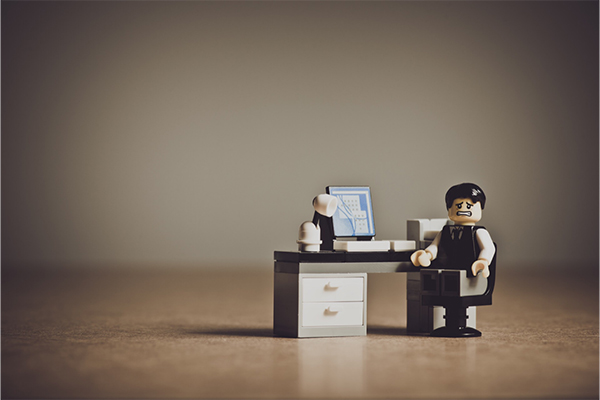A common character trait of many businesspeople, especially entrepreneurs, must be kept in check, says Mr. Loadlink.
I was jet lagged, my inbox was exploding, and I couldn’t remember the last time I went horse racing. For a moment, I wasn’t even sure what day of the week it was.
Now, I remember that time well; I made a note of it just to make sure I don’t go back. It’s not important when it was—only my close friends and family even know about it (until now!)—nor does it matter what label I put on my state of mind (burn-out could be one) but it was crucial that I learnt from it.
I’m very proud of my work ethic but I let it get the better of me. I’d convinced myself that one more hour with my nose millimetres from the grindstone was always worth it. I saw no harm in waking up to a notepad full of ideas and scrawled diagrams on my bedside table—the product of sleepless nights wondering how to gain 1% more productivity here or 2% more margin there. I thought, isn’t it great that I can be creative when everyone else is asleep? I cursed the hours when my body finally succumbed and I completely shut down; exhausted, I sunk into the pillow before I’d even thought about trying to get some sleep.
Sadly, many readers of this blog can probably relate to this. After all, what makes us successful entrepreneurs is a passion for what we do. And that’s the hardest thing to rein in. I never cursed any sleepless night, or 80-hour week (many were probably more) because I loved every minute of them. The buzz of working on an overnight flight before landing and going straight into the office was like a drug. Cramming as many trade shows as possible into a spring or autumn season kept adrenaline whizzing through my body at such a rate that I sometimes had to remind myself to eat.
That was ok, though, because there was always someone to have a networking dinner with so we could talk about work in between mouthfuls.

In hindsight, it’s clear how clouded my senses had become. I justified to myself missing barbecues with friends and family; and saw the layers of dust building up on my golf clubs as a sign of my success. I remember thinking back to the days when my company was in its infancy and I had time to swing a club or put on a snappy suit and spend a few hours at Goodwood, which is not only my local racecourse but also one of the most picturesque in the world. That entire caper was for those with time on their hands or a lack of drive. I couldn’t keep count of my shots on a course or place bets at a track and answer phone calls or brainstorm at the same time. So I didn’t do it.
Stress out
Any medical professional will tell you that enduring a state of stress over a long period of time is a harmful thing. It puts strain on all the organs and bodily functions that we need to take care of the most. The side effects—loss of appetite, sleepless nights, low immune system, low energy, headaches—are there for an individual to feel and their friends and family to see, but they’re somehow suppressed or given a different label. It’s the quality of air in aeroplanes that makes one feel drowsy, I’ve heard it said. Or, no wonder that high-flying business owner has constant headaches, performing such wizardry on spreadsheets until the small hours.
When entrepreneurs get together it creates an intoxicating, yet dangerous, environment. See a group of over-worked, highly stressed professionals in a huddle, laughing, and it’s usually because one of them has mentioned a television programme or favourite pastime. They might even have had the audacity to mention the upcoming weekend. Champagne is spat from their ulcer-ridden gobs and they double over their big guts. One scoffs: what chance have I got to watch TV?; another boasts: weekend, what’s that?; I remember when my handicap was down to seven—now I couldn’t even hit it off the tee, roars the most pale-looking of them all.
If none of this incentivises a reader to slow down, get this: working so many hours actually makes a person perform worse. Chances are, a solid 50-hour week and a weekend off with the family, perhaps with a gentle coaxing of ducks into a row on a Sunday evening, will yield greater productivity and efficiency than an 80-hour week where one has barely spared time to ask how a loved one’s day at school or work went. Think about it: how could I have been as dynamic and engaging at a trade show on the morning after an all-nighter at the laptop, than when I’d had a relaxing meal, seven hours of sleep, and a healthy breakfast? The mind is a powerful thing and it can seemingly convince a person, especially an entrepreneur, of anything.

Any medical professional will tell you that enduring a state of stress over a long period of time is a dangerous thing.
Here are my top four tips for anyone getting sucked into the world of busy fools:
- Get active
Schedule activities away from work and make them business-free zones. Whether it’s fishing, golf, horse racing, or billiards (fresh air activities are better), put plenty of it in the diary and make them as important as quarterly board meetings. Further, when the rod is cast, the ball is thwacked onto a fairway, the bet is place, or the black is potted, don’t let the workplace detract from the moment. Turn off one’s mobile phone and don’t put anything work-related in the diary immediately afterwards that might create a distraction or tempt a person to rush away from the fun. It’s amazing how mind, body, and soul can benefit.

Schedule activities away from work.
- Take long holidays
It’s remarkable how many successful people, with plenty of money, don’t take holidays. I’ve heard (and made) all the excuses in the book: I’ve got too much on to leave the office; I’d only spend the whole time in the room working; what if I couldn’t get reliable Wi-Fi?; I’d have too much to catch up on when I got back; the company would lose momentum without its leader; what example does it set if I sit on a beach for two weeks?; I’m happier at work than on a sun-bed or sight-seeing so what’s the point?
The most laughable of all of these is the necessity for a business leader to be at their company’s beckon call 24/7. Of course, it would be unwise to take a three-month tour of the Far East just days after registering a UK-focussed business at Companies House, but there’s something wrong with an established, successful firm if the wheels come off when the boss takes some time off. (I’ll come back to this point.)
- Prioritise relationships
There’s no point reflecting on a great career, prematurely bound to a rocking chair, if it has come at the cost of every hobby, friend, and family member a person had. It’s no badge of honour or achievement to say, “I’m a great businessman, that’s why I haven’t got any friends or family.” Make time for immediate and distant family; sign-up to memberships that have nothing to do with business; be on a WhatsApp group with people who don’t even know what you do for a living; have a circle of friends that ask how you are but not how work is going. At times of great need, these are the people who will step in, not the customers or suppliers that get the majority of an entrepreneur’s time. Get to the office on a Monday morning having forgotten about what it looks like for 60 hours.
- Take email off your phone
This has proven to be a game-changer for me. Like a lot of business leaders, indeed, anyone in most jobs these days, I get bombarded by emails that range from important messages from by business partner to spam about money laundering schemes. I got into a mentality that I was being judged by the time it took me to respond, forward, delete, or act upon messages. If it was 2:05am and a customer had asked a question, they’d have the answer by 2:10am. Every time I felt my phone vibrate, I’d check the message and deal with it. Now I have to log into my laptop to access messages, which is inconvenient and takes time. Great! It means I only address them when I’m settled at a desk with a cup of tea—not when I stir in the middle of the night.

Taking email off my smart phone has drastically reduced stress levels.
I wholeheartedly embrace the benefits of technology and I love my smart devices, but being a slave to an inbox is foolish. When I started my career as a rep, I used to carry a bag of 2p coins with me so I could stop and use a payphone by the roadside if I was running early or late for an appointment. Businesses back then still turned over millions of pounds. Whilst our companies are reliant upon technology and the efficiencies it creates, nothing is going to happen if an email doesn’t get replied to when one is at an airport or taking a taxi to a hotel.
As Steve Torres, CEO at Group Four Transducers Inc., told me once near his home in Boston, Massachusetts, it’s important to take time to smell the roses.
Good luck, Jessi; welcome, Kizzie
I alluded to the importance of systemising a business and building a strong team earlier in the piece. I don’t want to lose the hands-on approach that’s served me so well over the years, but much of being able to step away and implement any of the four tips outlined above depends on an entrepreneur’s ability to delegate and entrust a team.
We were very sorry to see Jessi Boskovic leave us recently; she had been with SP since school and blossomed into a consummate professional. However, we wish her well with a new challenge and remain proud that she will use the experience gained with us to no doubt be a huge success elsewhere. Jessie has been replaced by Kizzie Cordwell, inside sales, and the team is excited about working with her in the immediate and long-term future.
We had 18 applicants for the job and Kizzie was the outstanding candidate. I talk (and blog) a lot about the DNA we look for in prospective employees and we’re confident we’ve chosen wisely in our latest recruit.

Thank you for reading and use the hashtag #loadcell on social media.
Mr. Loadlink

It is important for business leaders to allow members of staff to represent the company on the front line. Dave Mullard, business development manager; and Mike Neal, product sales engineer, did a great job at the recent Vertikal Days, I hear.
